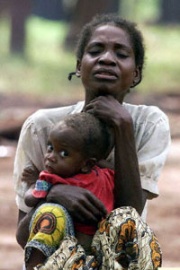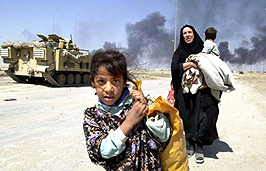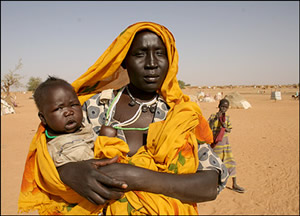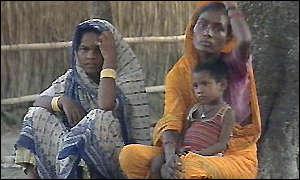Never Again:
Zephaniah 3:15 and the Hope of Divine Judgment
For Sunday December 17, 2006
Third Sunday in Advent
Lectionary Readings (Revised Common Lectionary, Year C)
Zephaniah 3:14–20
Isaiah 12:2–6
Philippians 4:4–7
Luke 3:7–18
 |
Democratic Republic of Congo. |
In his book The New Faces of Christianity; Believing the Bible in the Global South (2006), Penn State professor Philip Jenkins explores how most Christians in the world read Scripture with an immediacy that people in Europe and North America would find naive. In the west, for example, readers dismiss texts about the demonic as "scarcely even an embarrassment," says Jenkins, whereas readers in Latin America, Asia, and Africa interpret such texts more simply, because for them "a trip to the marketplace might well mean an encounter with a magician claiming to invoke pagan forces." Or consider the state. In the west, Jenkins notes, stable economies, governments and courts lend plausibility to our myth of secular progress, whereas in much of the world people experience the state as dysfunctional, corrupt, violent, and hostile, and so they read Biblical texts about subverting the powers more literally.
Evil powers and violent politics—along with starvation, disease, genocide, displacement, and crushing debt—are "principalities and powers" that threaten daily life for many people. For ordinary believers who live in contexts like these, the Bible offers a compelling, revolutionary, liberating, and explanatory narrative of hope rather than a pre-scientific myth that specialists must deconstruct. In particular, the Old Testament themes of divine retribution and human restoration ring true to these believers; they speak a language that many in the west have forgotten. The obscure prophet Zephaniah from this week's Old Testament reading provides a case in point.
Zephaniah's five-page prophecy is easy to describe, even if it is difficult to explain. At least twenty-five times he refers to "the day of the Lord" or semantic equivalents. Zephaniah announces a day of destruction for all the oppressors of the earth, whom he compares to ravenous wolves that feed all night, only to leave a pile of bones by morning. "The wicked will have only heaps of rubble when I cut off man from the face of the earth,” declares the Lord. Such will be “the great day of the Lord's wrath” (1:14), a day of bitterness, anguish, ruin and gloom.
 |
Iraqi refugees. |
When is this "day" of judgment? Zephaniah writes that it is “near” and “coming quickly” (1:7, 14). A natural reading is that he foresaw the coming invasion of Babylon, roughly fifty years away in his future. The Hebrews already knew the destruction that befell the northern kingdom of Israel a hundred years earlier in 722 BC at the hands of Assyria. But given Zephaniah's global pronouncements, he might have envisioned not only the near future in history for Israel, but also a far future beyond history for the whole cosmos. At any rate, discerning God's judgment has less to do with solving a puzzle about chronos (clock time), and everything to do with sensing kairos—that special moment when God speaks and acts today.
As one would expect, Zephaniah has harsh words for his own community. He deplores Israel's religious idolatry in the worship of Baal and Molech. He denounces wanton luxury predicated upon exploitation; these people flaunted “foreign clothes”—expensive imports from exotic destinations (1:8). The financial district, merchants and those who “trade with silver”—Jerusalem's Wall Street equivalent —will be “wiped out” (1:11). In the political, social, religious, and cultural realms violent oppression ruled the day (1:9, 3:1). Judah's government, its officials, prophets and priests were all characterized as predators who destroyed the powerless (3:3–4). This is a people, writes Zephaniah, who “knows no shame” (3:5).
Zephaniah's purview includes not just Judah or her surrounding enemies but the entire world. He expands his prophetic judgments to include the five surrounding nations of Philistia, Moab, Ammon, Cush and Assyria, and then again to include the whole earth. His vision is universal. Portions of his prophecy about “the day of the Lord” are directed to “the whole world” and to “all who live in the earth” (1:18; 3:8), the nations and kingdoms (plural) “on every shore” (2:11).
 |
Darfur. |
For readers in the west who scoff at notions of divine judgment as embarrassing or unworthy of God, the powerless in the "global south" remind us that the alternative is impunity for the Saddam Husseins of the world, along with the forfeiture of hope for vindication for the dispossessed who experience the unimaginable horrors of Baghdad, Congo, Rwanda, and Darfur. Stretching across twenty-five centuries, spoken to and for ancient Judaism but speaking today to Christians, Darfur's dispossessed Muslims, Hindu's untouchable Dalits, and all the exploited of the earth who have endured pillage, plunder, displacement, torture, starvation, burning of villages, and the systematic rape of their women no matter their age, Zephaniah prophesies a message of radical redemption: a day is coming when "never again will you fear any harm" (3:15).
The divine judgment that Zephaniah describes is the same for God's elect as for their pagan enemies. He insists that Yahweh plays no favorites. With his pronouncements about not only Israel's arch-enemies but also the nations and peoples of the entire earth, Zephaniah is an egalitarian globalist far ahead of his time.
We rightly dismiss caricatures of divine judgment that picture God as capricious, arbitrary, vindictive or sadistic. Rather, God's judgment is a purifying response to everything that dehumanizes us—violence, oppression, religious fakery, exploitation, exile, disease, famine, and war. Does our moral imagination really believe that a Charles Taylor, Omar al-Bashir, or an Idi Amin slaughters with impunity? Do I really want God to leave me to my own worst impulses of envy, greed, anger, and lust, or do I want Him to judge, rescue and purify me from them? To me, the most terrifying texts in the Bible are not those of divine judgment but those that suggest that God abandons us to the consequences of our own sin, poor choices, foolishness, apathy, ignorance, and the like (cf. Romans 1:24, 26, 28). The "refiner's fire" that John the Baptist announces in this week's Gospel can purge, cleanse and restore us.
 |
Hindu "untouchables". |
In Zephaniah Yahweh's retribution is thus redemptive. It is not a merely punitive end in itself but a means to a better end. God scatters, but He also gathers (3:20). Zephaniah announces impending doom, but he also issues an invitation and appeal. He beseeches us to seek the Lord “before” (3 times) the awful day of the Lord. Divine judgment is not inevitable, it is not some immutable law of fate. Should we repent, as John the Baptist invites us to do in this week's Gospel, God is eager to restore.
Zephaniah envisions a day when God “takes away our punishment,” a time when “you will not be put to shame for all the wrongs you have done to me” (3:11, 15). It is a day when Yahweh is “mighty to save,” a time when He “takes great delight” in us, a time when he will “quiet us with His love and rejoice over us with singing” (3:16–17). Echoing his prophetic compatriots, Zephaniah says that the day of the Lord is ultimately a day when “the nations on every shore will worship him, everyone in his own land” (2:11; Isaiah 2:2, Micah 4:1–2, and Zechariah 8:22–23). A day is coming, he predicts, when "never again will you fear any harm" (3:15).
For further reflection
* How do you understand God's judgment?
* What did Jesus mean when he said "for judgment I came into the world" (John 9:39)?
* How has your social location influenced your reading of the Bible?
* If given the opportunity as a Christian, what would you tell refugees from Darfur, Congo, or Iraq?
* See Samantha Power, A Problem From Hell; America and the Age of Genocide (2002), and Philip Jenkins, The New Faces of Christianity; Believing the Bible in the Global South (2006).





